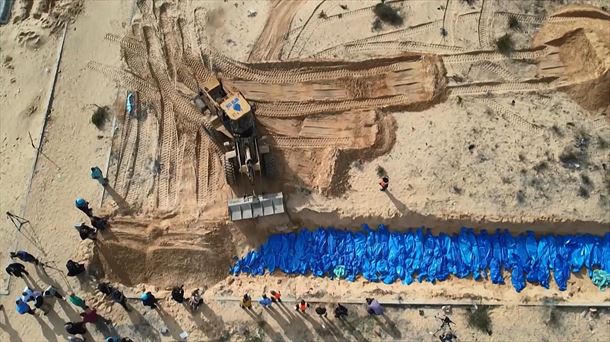The escalation of war comes as the rules-based global order “is in danger of collapsing,” as evidenced by the inaction of Israel’s allies as evidence of war crimes “continues to pile up” in Gaza. The NGO warns of other conflicts such as Ukraine, Myanmar and Sudan.
International Amnesty has warned of the “terrible consequences” that the escalation of war conflicts all over the world and collapse of international lawto which will be added the “rapid” advances in artificial intelligence, whose effects can be negative. In its annual report The situation of human rights in the worldthe NGO has made a less than hopeful reading of the current geopolitical situation.
He “gloomy outlook” drawn by AI is explained by a frequent violation of the rules that states have given themselves, in a context of growing inequality where “superpowers compete for supremacy” while the climate crisis worsens.
With regard to war conflicts, Amnesty International has paid special attention to the situation in Loopwhere the actions of Israel “are genocide warning signs” before the lack of action by its allieswhich only aggravates “Israel’s flagrant disregard for international law,” according to Agnes Callamardthe general secretary of the NGO.
Callamard emphasizes that the global order based on rules “is in danger of collapsing”, precisely due to the action or inaction of those who “were precisely the architects of the international legal order” created after the Second World War.
AI regrets that the conflict shows no signs of abating, but that “indications of war crimes continue to accumulate while the Israeli Government flouts international law in Gaza”, to which is added the “blatant use” of the law of the United States veto in the UN Security Council and the double standards of European countries, which express “founded protests against war crimes by Russia and Hamas, while supporting the actions of the Israeli and American authorities” in Palestine.
In the report, AI also notes the “flagrant violation of established rules committed by Russian forces” since their large-scale invasion of Ukraine. Russia persists in “indiscriminate attacks against densely populated civilian areas” and energy and grain export infrastructures.
In the report, the actions against civilians in Myanmarby the armed forces and associated militias, which have left more than 1000 murders in 2023 alone, and the civil war in Sudan, where the two opposing parties show “little interest in international humanitarian law.” This forgotten conflict has caused the world’s biggest displacement crisiswith more than 8 million people forced to flee.
Technology as a tool for hate and discrimination
In the extensive list of human rights violations, the NGO highlights the instrumentalization of technology, both new and existing, to generate “hatred, division and discrimination.” Take as an example the facial recognition to control public protests in countries such as the United States, the United Kingdom, Argentina, Brazil or India, and, once again, points to Israel in its mastery of the use of this technology in the West Bank busy, where it uses facial recognition to help maintain the apartheid system.
Technology is not only used to repress protests, but also, abusively, to stop migration and control borders. This “perpetuates and reinforces discrimination, racism, and disproportionate and unlawful surveillance against racialized people.”
Meanwhile, the use of spyware like Pegasus, especially against journalists and civil society activists. AI warns of the risks of not regulating its use, nor generative artificial intelligence. Despite the EU’s digital services law, regulation “has largely remained stagnant.”
“We have seen how hate, discrimination and misinformation are amplified and propagated by social media algorithms optimized to maximize ‘engagement’ above all else,” Callamard explains.
On the other side of the coin, Amnesty International mentions an “unprecedented” global mobilization, such as, for example, protests across the planet calling for an end to the genocide in Gaza. Although they have not borne fruit, the NGO does mention other achievements of civil society: the Sexual Assault Crime Prevention Law in Taiwan; the COP28 measures, and freedom of Matiullah WesaAfghan education activist, after months of campaigning in his favor.
The NGO influences the collapse of a system supposedly based on international law. “Given the grim global situation, urgent measures are needed to revitalize and renew international institutions designed to safeguard humanity. Steps must be taken to reform the UN Security Council so that permanent members cannot exercise their voting power without any control to prevent the protection of civilians and reinforce their geopolitical alliances,” Callamard demands.
Source: Eitb
I am Michael Melvin, an experienced news writer with a passion for uncovering stories and bringing them to the public. I have been working in the news industry for over five years now, and my work has been published on multiple websites. As an author at 24 News Reporters, I cover world section of current events stories that are both informative and captivating to read.

